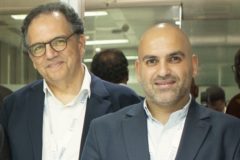
Dreamer and doer Samuel Uloko has big plans for smallholder farmers. He wants to make the seemingly impossible possible with his early-stage startup, Achesa Agribusiness Consult, which was supported by FCMB’s HubOne, UNDP, BAIHub, NEHIHub, CEFTER, and others, to emerge winner at the grand finale of the Agrohack 2022 Challenge. In this interview, he speaks on the plans of his startup for smallholder farmers, among other issues. Excerpts…
How did you hear about the Agrohack Challenge and what inspired you to participate?
I first saw the Agrohack Challenge advert online, precisely on “TechPoint Africa”. The calibre of organisations and governments sponsoring the competition inspired me to participate in the challenge, notably HubOne powered by FCMB, UNDP, BAIHub, NEHIHub, CEFTER, the Japanese Government, Benue State Government, Feed the Future and Thrive Agric. These are true lovers of agriculture and promoters of AgriTech startups in Nigeria and Africa. What else can you ask for besides having these organisations and governments in your life as an entrepreneur? Trust me; the sky can only be the limit.
What problem did you decide to solve and what was your motivation for picking that problem?
Achesa Agribusiness Consult chose to go for solving the problem of poverty among smallholder farmers. My motivation was how this would improve the lives of the smallholder farmers, the rural economy, and the nation. In addition, by supporting these smallholder farmers, I would also be solving other problems, especially youth unemployment, insecurity, and food insecurity.
What specific skills made it possible for you to develop your solution?
My first degree in Agricultural and Bioresources Engineering, Master’s degree in Disaster Risk Management and Development Studies, Lagos Business School programmes – Agribusiness Management Program, AgMP-1, and Advanced Management Program, AMP-34 – as well as over a decade of experience gathered from working with some of the leading Agribusiness/AgriTech startups in the country. I was Head of Operations at Babban Gona, Chief Technical Officer at Value Seeds, Divisional Manager at Manoma and Head of Country Operations and Expansion at Thrive Agric. Joining these startups when they were starting was a plus for me, as I was very present to weather the storm of setting up.
I have built competencies and skill sets that made it possible for me to develop my solution in several areas, such as creativity, innovation, problem-solving, leadership, communication, accountability, agronomy, time management, and teamwork, among others.
How will Achesa help smallholder farmers in Nigeria?
Achesa will help improve the incomes and livelihoods of Nigerian smallholder farmers by providing a sustainable, private-sector channel for the cost-effective delivery of enhanced agricultural technologies and services that optimise yields and labour productivity while simultaneously improving market access. Utilising a sustainable private sector franchise model, Achesa will provide cost-effective end-to-end services to the network of smallholder farmers. The Achesa model will overcome a key underlying structural problem that keeps smallholder farmers poor in the form of low economies of scale.
What services and resources do Achesa provide to smallholder farmers?
The Achesa model provides the required economies of scale to efficiently deliver services to smallholder farmers, such as credit, financial services, technology and digital services, agronomic advisory through our e-extension services, agricultural input (certified seeds, fertilisers, CPPs, sacks, needles, and threads), commodity aggregation and storage services, commodity marketing services.
Have the lives of smallholder farmers changed since using Achesa’s services?
Member farmers applying Achesa’s best-practice farming methods have seen their yield increase up to three times above the national average. Providing modern agricultural equipment, especially suited to smallholder farming and the holistic package of best practices has significantly increased our member farmers’ efficiency, labour, and agricultural productivity.
What do you think will be the long-term impact of Achesa on smallholding farming in Nigeria?
The first is increased income. The long-term strategy of Achesa is to have fixed off-take agreements with end customers across the year. This will increase the value to our farmers and, in turn, provide a better income from premium payments to farmers at harvest, improving the nutrition and general livelihoods of farmers and their families. This would also enable the smallholder farmers to increase their farm holdings, thereby contributing towards achieving Nigeria’s food security. This is in addition to job creation.
Achesa currently provides an economic livelihood for over 3,200 farmers and 58 administrative and operations staff members. Achesa is expected to provide an economic livelihood for over 100,000 smallholder farmers by 2027 and one million by 2035. Another impact is that there will be less use of child labour with increased child school attendance. Due to mechanisation services provided, farmers will be less reliant on family child labour for critical tasks such as land preparation and harvesting, thereby increasing school attendance and, in turn, contributing to breaking the cycle of poverty.
Looking at your journey so far, what was easy? What was hard?
For me, the easy things were hiring a competent and dedicated workforce, setting up the operations, onboarding creditworthy smallholder farmers, and paying salaries and farmers’ harvest balance and commodity sales. The hard things that can also become opportunities are raising funds, input procurement directly from manufacturers, procurement of work tools such as bikes for the field team and securing commodity storage space.
Did your approach to problem-solving change over time during the challenge?
During my presentation, I got an insight from one of the judges to rethink how I currently sell and reach out to the farmers. I can build a marketplace that the farmers can access, thereby deciding on the kind of input and services they require instead of just closing up our minds to the fact that they can use these platforms. This would enable us to reach out to even more farmers effectively and efficiently.
Are there any lessons that you learned from participating in this competition?
Yes, I learned a lot from participating in the challenge, notably refining my pitch deck after getting some learnings from the training on pitch deck development put together by 8th Gear.
Do you have any advice or tips for future participants in the Agrohack Challenge?
Future participants should ensure they have researched the problem they intend to solve and developed a product fit for the market before participating in the challenge. This would ensure they have a practical understanding of their business and have the confidence to pitch.
What exciting opportunities are you looking at for 2023?
I want to meet key investors in the space and raise N3.5 billion to finance 10,000 smallholder farmers for the 2023 farming season. In addition, I want to lock in partnerships with Nestle, WFP and other premium commodity buyers in the space.


















